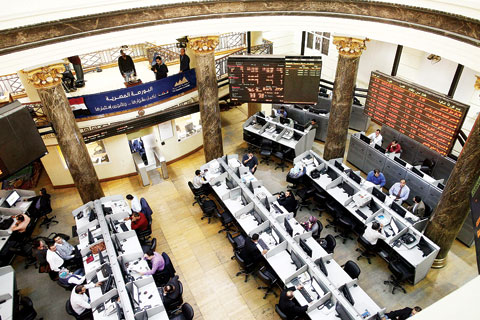
The Ministry of Finance attributed the “unsatisfactory economic activity” in Q1 2014, which witnessed merely 1% in the gross domestic product’s (GDP) real growth rate, to political instability and insecurity. It added that public investment projects take time to be processed and implemented.
GDP growth rate registered 0.3% during the first quarter of FY 2011/2012 and 2.6% during the same period in FY 2012/2013.
“We need political security and liquidity to overcome the economic dilemma that we’re facing,” said Magdy Toulba, an economic expert and chairman of Arabian House of Consultancy for Financial and Economic Investment. “We had more that 3,500 factories shut down with an ailing level of exports and tourism.”
“Our economy is still in the intensive care,” Toulba added.
The ministry also mentioned that “the current expenditure component of the first [stimulus] package was relatively modest to have a notable multiplier effect throughout the economy”.
In its Mid-Year Economic and Fiscal Review report, the finance ministry said that the expansionary fiscal and monetary policies, which included two stimulus packages that amounted to 1.5% and 3% of the GDP, are expected to increase the GDP growth rate to about 3.5% by June 2014.
“In the second half of the year, public investment projects, the settlement of arrears, support to closed factories and wage increases are all expected to boost aggregate demand and spur economic activity,” the ministry added.
Mesbah Qotb, the finance minister’s adviser for public outreach, told the Daily News Egypt on Wednesday that Egyptian workers in various public sectors, including the Postal Authority and the Public Transportation Authority, who have participated in strikes last week, are not eligible for the minimum income.
“Only employees who work in the collections units of the ministries, government localities and service authorities, such as the Veterinary Medicine Authority, fall under the categories of those who will receive the announced minimum income increases,” Qotb said.
The ministerial report added that public investment and consumption are expected to grow in real terms by approximately 14.3% and 9.8%, respectively.
“During the next FY, real growth is expected to pick up to above 4%, gradually surpassing GDP potential over the medium term,” the ministry’s report noted.
The Finance Ministry said that it has adopted a number of necessary reforms, such as the new VAT law, the revised property tax law, the new mining law, a new income tax code and a gradual rationalisation of energy subsidies, to “spur economic growth and ensure fiscal and debt sustainability”.
The report mentioned that these tax reforms will not necessarily undermine economic competitiveness or living standards. It added that Egypt is under-taxed compared to peers in most of the emerging markets and developing countries.
“Further reforms will be needed to achieve sustainability in the medium term,” the ministry said, defining these additional reforms as “revamping the tax system, revisiting social and health insurances, restructuring state-owned enterprises, along with notable improvements in the business environment and labour markets.”
The ministry added that major initiatives must be made in order to improve the quality of the education and health sector.
The report pointed out that the government decided to pursue expansionary policies to jumpstart the economy and respond to social demands while keeping the budget deficit under control. It added that this option was made possible due to “the availability of untapped Ministry of Finance deposit at the CBE and subsequent support from the Arab Gulf neighbours.”
The ministry’s report stated that sluggish economic growth, high unemployment, a large and unsustainable fiscal deficit and public debt, rising poverty and inequality were among the major challenges that faced the government at the end of June 2013.

Government’s economic prospects
Regarding economic prospects during the coming few years, the ministerial report said that the political stability that will be brought about following the implementation of the political roadmap, along with the commitment of this government and the coming one, will result in a brighter future for the economy.
The report added that the region’s keen interest in the success of Egypt and the Egyptian economy will also aid in improving the economy.
Earlier in February, interim Minister of Finance Ahmed Galal said that Kuwaiti Finance Minister Anas Al-Saleh asserted his country’s interest in bolstering the Egyptian economy on all levels, emphasising Egypt’s ability to overcome all its challenges.
According to the finance ministry, the Kuwaiti minister said that his government aims to increase investments in Egypt and encourage the Kuwaiti private sector to pump more investment in Egypt’s economy.
“We will have a clear vision of our economic state in a six months period,” Toula said, adding: “I anticipate a surge in the GDP following the presidential and parliamentary elections.”
“Over the medium term, the budget deficit is projected to decline below 6% of GDP and public debt to fall to 74% of GDP by FY 2018,” the finance ministry report read.


